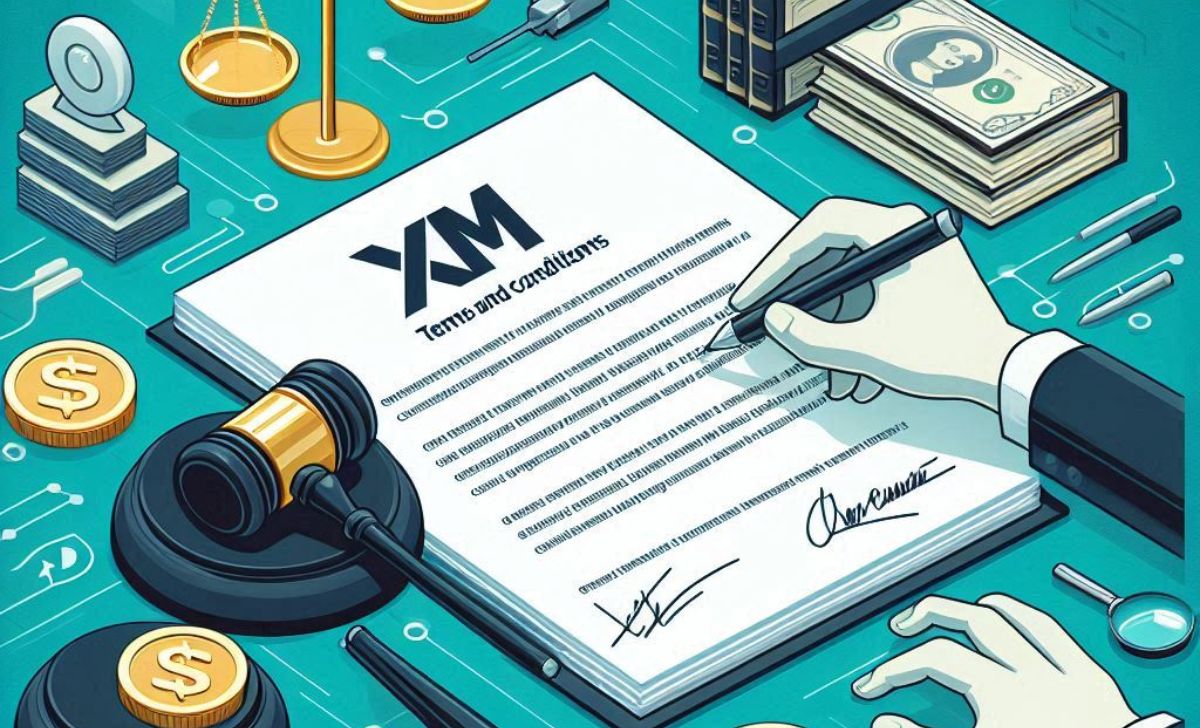Terms & Conditions XM
Terms & Conditions XM outline the legal framework and trading policies that govern every user’s interaction with the platform. From account usage and risk disclosures to bonus terms and order execution, understanding these conditions is essential for compliant and informed trading.
Before opening a trading account, every trader should read and understand the terms they are agreeing to. XM provides a transparent, detailed set of terms and conditions that define user rights, responsibilities, and trading procedures. In this article, we’ll highlight the key sections you need to know.
What Are Trading Terms & Conditions at XM and Why Do They Matter?

Trading Terms & Conditions (T&C) at XM refer to the legally binding rules and operational policies that govern the relationship between the trader and the broker, covering everything from account usage and leverage to withdrawal rules and dispute resolution. Understanding these terms is essential, as they outline your rights, obligations, and the broker’s responsibilities in every trade.
What Are Terms & Conditions in the Context of Forex Brokers?
T&C are the broker’s official policies, usually found in downloadable PDFs or web pages, that define how you are expected to use their platform and services.
Typical contents include:
-
Leverage limits and margin rules
-
Bonus eligibility and withdrawal restrictions
-
KYC/AML policies (Know Your Customer & Anti-Money Laundering)
-
Inactivity fees, swap policies, and execution methods
For XM, these terms apply globally across platforms (MT4, MT5), and are updated periodically to reflect changes in regulation or trading conditions.
What Happens If Traders Ignore the Fine Print?
Ignoring T&C can result in serious consequences, even if unintentional:
-
Bonus cancellation: Traders may lose welcome bonuses for violating hidden conditions (e.g., withdrawing too early)
-
XM Withdrawal rejections: Using third-party payment methods or unverified accounts may block payouts
-
Account suspension: Violations like arbitrage abuse or multiple account registrations under one IP can trigger bans
-
Dispute rejection: Complaints are dismissed if users are found to have broken signed agreements
In XM’s T&C, Clause 17.2 (as of 2024 revision) explicitly allows them to take action without prior notice in the event of misuse or breach of fair use policies.
Which Regulatory Bodies Govern XM’s T&C?
XM is regulated by multiple financial authorities, and its Terms & Conditions reflect compliance with each region’s legal framework:
| Regulatory Body | Applies To Clients From | Key Oversight Areas |
| CySEC (Cyprus) | EU countries | Bonus bans, leverage caps, client funds segregation |
| ASIC (Australia) | Australia & some Asia-Pacific | Trade transparency, stop-out levels, investor protection |
| FSC (Belize) | Global clients (e.g., Vietnam, MENA) | Flexible leverage, local payment rules, KYC policies |
These regulators require that all T&C be public, regularly updated, and consistent with international financial conduct standards.
Key Clauses in XM’s Terms & Conditions You Should Know

XM’s Terms & Conditions contain essential clauses related to account creation, payments, fees, and trading costs, all of which directly affect your trading experience and rights as a client. Understanding these core sections helps you avoid delays in XM deposits or withdrawals, comply with KYC rules, and trade with full awareness of cost structures and broker limitations.
Account Registration and Identity Verification (KYC)
This section outlines the required documentation and conditions to open and maintain a trading account. XM strictly follows Know Your Customer (KYC) protocols to prevent fraud and ensure regulatory compliance.
Key points from this clause:
-
You must submit government-issued ID and proof of residence before funding or trading
-
The account name must match the name on all payment methods
-
Multiple accounts from the same IP or identity may result in suspension or merging (Clause 3.5 – XM T&Cs)
Why it matters: Failing to complete KYC may lead to withdrawal rejection or account freezing, especially if your profile is flagged for inconsistency.
Deposit/Withdrawal Terms and Processing Times
This clause covers how deposits and withdrawals are handled, including:
-
Processing times (e.g., instant deposits via local banks, but 1–3 days for withdrawals)
-
Withdrawal must be made using the same method used for deposit (anti-money laundering policy)
-
XM may decline third-party payments (Clause 5.2 – Payment Methods section)
-
All payments are subject to internal review, especially if bonus abuse or suspicious activity is detected
Pro tip: Withdrawals via Vietnamese local bank transfer are often processed within 24–48 hours, but may take longer if additional verification is needed.
Commission, Spread, and Hidden Fee Disclosures
This clause details how XM earns through spreads, commissions (on specific account types), and other potential charges.
Important highlights:
-
Standard and Micro accounts: zero commissions, but wider spreads
-
Ultra Low and Shares accounts: tighter spreads, but may include commissions or swap charges
-
Inactivity fee: Applies if there is no trading activity for 90 days (Clause 8.1 – dormant accounts)
-
Currency conversion charges may apply if trading in a different base currency
While XM advertises no hidden fees, these details may not be obvious unless you read the T&Cs closely. Always check your account type’s specifications.
Which XM Terms & Conditions Should Traders Pay Special Attention To?

Yes, there are specific Terms & Conditions XM that traders often ignore but can seriously impact their trading, including inactivity fees, bonus violations, and the broker’s right to suspend accounts. These clauses are often hidden in long documents, but being aware of them will help you avoid losing bonuses, being charged unexpected fees, or facing account termination without warning.
Is There a Clause About Inactive Accounts?
Yes. XM clearly states that if your account has no trading, deposit, or withdrawal activity for 90 days, it will be marked as inactive or dormant (Clause 8.1 of the Client Agreement).
What happens:
-
A monthly inactivity fee of $5 USD (or equivalent in other currencies) is deducted automatically
-
If the account has no balance, XM may close it without notice
-
The fee applies to all account types unless closed manually
To avoid it: Make a trade, deposit, or withdrawal at least once every 3 months
What Happens If Bonus Rules Are Violated?
If you break XM’s bonus rules, you can lose both the bonus amount and any profit made using the bonus, even if your trades were successful.
Common violations include:
-
Withdrawing money before meeting trading volume conditions
-
Using multiple accounts to claim the same bonus
-
High-risk strategies aimed at exploiting bonus loopholes
XM Bonus Terms example: For the $30 No Deposit Bonus, you must verify your identity and trade at least 5 standard lots to withdraw profit. If you fail to meet this, your bonus and profits will be removed.
Bonus terms are often separate from the main agreement — always read them on the XM Promotions page.
Can XM Terminate Trader Accounts Unilaterally?
Yes. XM reserves the right to terminate or suspend your account without prior notice if you breach their rules or engage in activity that puts the broker at risk (Clause 17.2 – Client Agreement).
XM may take this action if:
-
You violate trading conditions (e.g. latency arbitrage, bonus abuse)
-
Your identity documents are inconsistent or fraudulent
-
You use unauthorized Expert Advisors (EAs) that affect execution systems
XM is regulated by CySEC, ASIC, and FSC, and must act quickly to protect itself and clients from suspicious behavior.
To stay safe:
-
Use only one verified account
-
Avoid exploiting bonuses or using prohibited trading methods
-
Respond to KYC requests without delay
See more XM trading products:
Trading and Execution Clauses in XM’s Terms & Conditions

XM’s Terms & Conditions include specific clauses related to how trades are executed, particularly during news events, slippage conditions, and the use of automated systems such as Expert Advisors (EAs). These rules are vital for traders to understand, especially those relying on fast execution, news trading, or algorithmic strategies.
Does XM Adjust Spreads or Quotes During News Events?
Yes. XM uses a variable spread model, and the broker explicitly states that spreads may widen during high volatility, particularly around major economic announcements or during low-liquidity market sessions (e.g., rollover hours).
As outlined in their execution policy:
-
XM operates on a Market Execution basis — meaning no guaranteed pricing
-
No requests are issued, but the price you receive may differ from the one requested during fast markets
-
The spread is not fixed. Even on Standard accounts — it reflects underlying market conditions
For traders: Expect spread spikes during NFP, CPI, FOMC releases, etc. This is normal and disclosed in XM’s documentation.
Are Slippage and Requote Clauses Included?
Yes. XM openly acknowledges the possibility of slippage in its Terms & Conditions and execution policy. This applies to all account types and asset classes.
Key points:
-
Slippage may occur during volatile periods or fast market conditions
-
It is not considered an execution error but a result of market mechanics
-
No requests are applied because orders are filled at the best available price at the time of execution
Example from XM’s policy: Under certain market conditions, your order may not be executed at the price you requested. XM executes orders at the next best available market price.
This enhances transparency, but traders should still use protective tools like limit orders and stop-loss.
Are Automated Trading Systems (EAs) Restricted on XM?
Generally, no — XM permits the use of Expert Advisors (EAs) on both MT4 and MT5 platforms. However, certain EA behaviours may violate XM’s T&C, especially if they disrupt execution infrastructure or exploit system vulnerabilities.
What’s allowed:
-
EAs for scalping, hedging, or strategy automation
-
Multiple timeframes, custom indicators, trailing stops
What may breach terms:
-
Latency arbitrage or price manipulation
-
EAs that generate excessive server load or API calls
-
Using EAs across multiple linked accounts to abuse promotions
Clause 17.3 of XM’s agreement gives them the right to terminate accounts abusing automated systems, particularly if fair usage policies are breached.
XM’s Dispute Resolution and Complaint Handling Policy

Understanding a broker’s dispute resolution policy is essential for traders, especially in cases involving withdrawal issues, execution errors, or account disputes. These mechanisms ensure that traders have access to fair handling and possible compensation, particularly under the oversight of regulatory bodies like CySEC.
Where can traders file a complaint with XM?
Traders can submit a complaint directly through the XM Member Area or by email to the XM Support team. If the issue is not resolved informally, traders are encouraged to follow the official complaint submission process:
-
Fill out the Complaint Form available on XM’s official website.
-
Submit it via email to [email protected].
-
The Compliance Department will acknowledge receipt within 5 business days, and provide a final response within 2 months, depending on the case complexity.
All complaints are handled by an independent internal unit, ensuring objectivity and adherence to regulatory standards.
Does XM comply with any investor compensation fund?
Yes. XM operates under Trading Point of Financial Instruments Ltd, which is regulated by CySEC (Cyprus Securities and Exchange Commission) and is a member of the Investor Compensation Fund (ICF).
The ICF protects eligible retail clients in case the firm becomes insolvent or fails to meet its obligations. The fund can compensate up to €20,000 per client, depending on the nature of the claim and eligibility.
This protection adds a layer of security and is aligned with EU Directive 97/9/EC, offering peace of mind in worst-case scenarios.
See more:
Is there a time limit for submitting a dispute or complaint?
Yes. XM recommends that traders file any formal complaint as soon as possible after the incident occurs. While there is no strict universal deadline, CySEC guidelines suggest that complaints be made within a reasonable time frame—preferably within 6 to 12 months.
Failing to act within this period may reduce the chances of compensation or full investigation. For regulatory escalation (e.g., filing with CySEC), time sensitivity is even more crucial.
By reviewing XM’s Terms & Conditions, traders can avoid misunderstandings and make decisions with greater confidence. Whether you’re just starting out or already trading actively, staying informed about these legal guidelines is a smart step toward long-term trading success.

 Tiếng Việt
Tiếng Việt